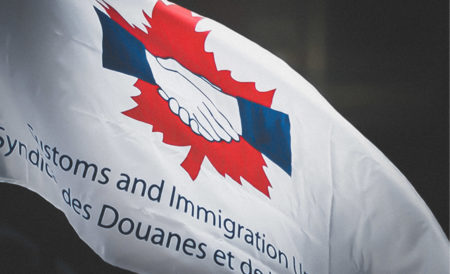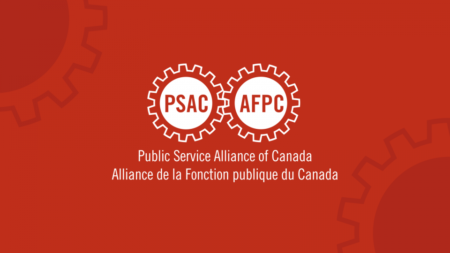Ottawa, September 21, 2023 – Members of the Public Service Alliance of Canada (PSAC) and the Customs and Immigration Union are rallying to call on Treasury Board and the government to live up to their commitment to provide CBSA law enforcement officers equitable retirement benefits.
- Date: Thursday September 21, 2023
- Time: Rally starting at 12:30 p.m.
- Location: Treasury Board of Canada, 90 Elgin Street, Ottawa
CBSA law enforcement officers work in demanding and physically challenging roles, and face similar physical demands and risks as their counterparts in other law enforcement agencies across the country. However, they do not receive equivalent retirement benefits. Instead, many older employees are forced to accept limited duties and opportunities for advancement as they near retirement, as firearms and use of force certification become more difficult as workers age.
Recognizing this, the government has committed to making legislative amendments to provide “25 and out” early retirement benefits, but this has yet to be done. This would allow officers to retire with dignity after 25 years of service.
“With very few exceptions, almost all law enforcement and public safety workers – both provincially and municipally – receive 25 and out retirement benefits. This includes firefighters, air traffic controllers, RCMP constables, operational employees of the Correctional Service of Canada, and more,” said Mark Weber, CIU National President. “It’s time for this government and Treasury Board to step up to the plate and show that they understand and support workers at CBSA.”
Speakers include:
- Mark Weber, National President, Customs and Immigration Union
- Chris Aylward, National President, Public Service Alliance of Canada
- Brea Baresinkoff, FB group bargaining team member
More than 10,000 PSAC-CIU members working at CBSA are currently in negotiations with the federal government, where equitable retirement benefits, job security, telework, and fair wages that keep up with the cost of living are key issues at the bargaining table.
Information and interviews:
PSAC Media Relations
media@psac-afpc.com
613.714.6610







